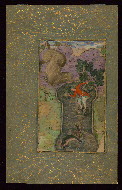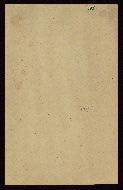Home > Digitized Walters Manuscripts
This document is a tranformation of a TEI P5 XML manuscript description incorporating images. If you have trouble reading special or non-Latin characters on this page, please make sure you have appropriate Unicode fonts installed and an up-to-date web browser.
Walters Ms. W.692, Single leaf from Anvar-i Suhayli by Khashifi
Browse images (Browse images in a new window) | TEI in XML format
W.692
Single leaf from Anvar-i Suhayli by Khashifi
Vernacular: انوار سهيلى
Authority name: Kāshifī, Ḥusayn Vāʻiẓ, d. 1504 or 5
Supplied name: Ḥusayn ibn ʿAlī Vāʿiẓ Kāshifī
Name, in vernacular: حسين بن على واعظ كاشفى
This illustration is from a Mughal manuscript copy of Anvār-i Suhaylī (The lights of Canopus), a collection of fables by Ḥusayn ibn ʿAlī Vāʿiẓ Kāshifī (d. 910 AH / 1504-5 CE). It dates to the late tenth century AH / sixteenth CE or early eleventh century AH / seventeenth CE. The text narrates the fate of a man who, escaping from a wild camel, jumps into a well. There his predicament grows even more precarious when he lands on the heads of four snakes, grasps in desperation at a bush gnawed by two rats, and looks down to see dragon waiting to devour him should he fall.
Early 11th century AH / 17th CE
India
Leaf
Literary -- Prose
No linguistic content; Not applicable
Paper
Mounted on pasteboard
Foliation: Not applicable
21.0 cm wide by 33.5 cm high
- Image: 12.4 cm wide x 20.7 cm high
- Title: Anvār-i Suhaylī
- Author: Kāshifī, Ḥusayn Vāʻiẓ, d. 1504 or 5
- Decoration note: Bluish-gray paper with illuminated floral, bird, and animal decoration for the border
fol. W.692a:

- Title: A dragon in a well
- Form: Illustration
- Label: This illustration is from a Mughal manuscript copy of Anvār-i Suhaylī (The lights of Canopus), dating to the late tenth century AH / sixteenth CE or early eleventh century AH / seventeenth CE. The text narrates the fate of a man who, escaping from a wild camel, jumps into a well. There his predicament grows even more precarious when he lands on the heads of four snakes, grasps in desperation at a bush gnawed by two rats, and looks down to see a dragon waiting to devour him should he fall.
fol. W.692b:
Walters Art Museum, 1931, by Henry Walters bequest
Grube, Ernst J. A Mirror for Princes from India: Illustrated Versions of the Kalilah wa Dimnah, Anvar-i Suhayli, Iyar-i danish, and Humayun nameh. (Bombay: Marg Publications, 1991), 67.
Principal cataloger: Gacek, Adam
Catalogers: Landau, Amy; Smith, Sita
Editor: Bockrath, Diane
Conservators: Jewell, Stephanie; Quandt, Abigail
Contributors: Barrera, Christina; Emery, Doug; Herbert, Lynley; Noel, William; Simpson, Shreve; Tabritha, Ariel; Toth, Michael B.; Valle, Chiara
The Walters Art Museum
Licensed for use under Creative Commons Attribution-NonCommercial-ShareAlike 3.0 Unported Access Rights, http://creativecommons.org/licenses/by-nc-sa/3.0/legalcode. It is requested that copies of any published articles based on the information in this data set be sent to the curator of manuscripts, The Walters Art Museum, 600 North Charles Street, Baltimore MD 21201.
